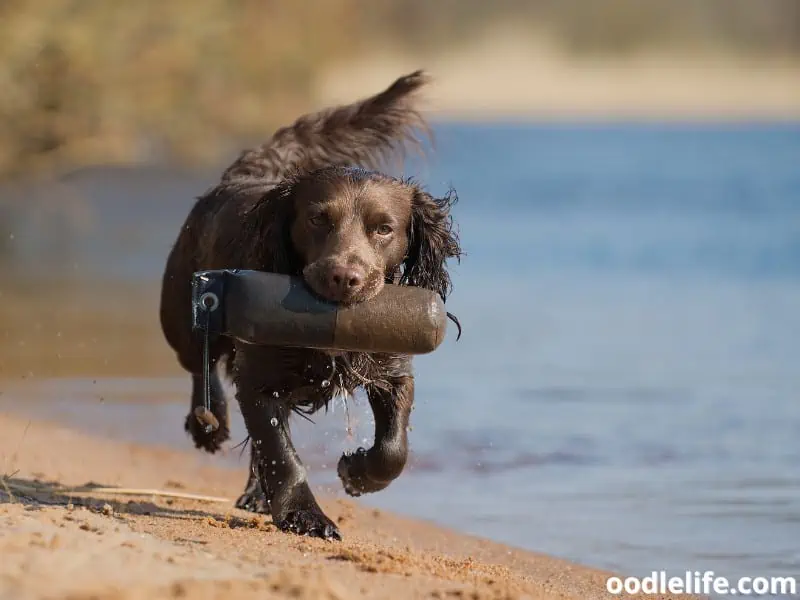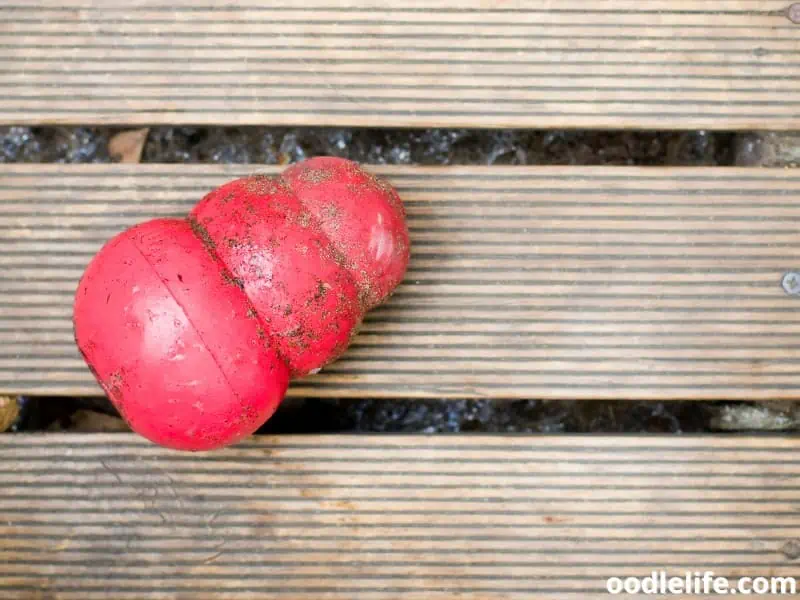11 EFFECTIVE Techniques for Calming Down Cocker Spaniels
Cocker Spaniels are known for their energetic and friendly personalities, which can sometimes lead to over-excitement and hyperactivity. Learning how to calm down a Cocker Spaniel is essential for creating a harmonious home environment and building a strong bond between you and your furry friend. Understanding the needs of this sensitive breed and employing a few strategies can help your Cocker Spaniel become calm and well-behaved.
Firstly, it’s important to recognize that a Cocker Spaniel’s energy levels depend on their age and individual temperament. Regular exercise, both physical and mental, is crucial to keeping a Cocker Spaniel’s excitement in check. By providing a consistent routine of daily walks, play sessions, and mental stimulation through training, you can help keep your pup happy and relaxed.

Remember that this breed responds best to calm and positive reinforcement, so patience and affection should be at the core of your interactions.
Another essential factor in helping a Cocker Spaniel remain calm is creating a stress-free environment. As a sensitive breed, they are prone to anxiety, especially when exposed to loud noises or unfamiliar situations. Providing a designated “safe space” in the form of a comfortable bed or crate can act as a refuge during these moments, allowing your pet to decompress and regain their sense of calm.
Additionally, using tools like puzzle toys, calming music, and regular bonding time can also contribute to a sense of security and contentment for your Cocker Spaniel.
Understanding Cocker Spaniels
When we talk about Cocker Spaniels, we’re referring to a breed known for its high energy levels and playful demeanor. As a dog owner, it’s crucial to understand your Cocker Spaniel’s specific needs and temperament to ensure a happy and harmonious life together.

Cocker Spaniels are often full of energy, which makes them great companions for active families. Their seemingly endless enthusiasm is a trait that makes them fantastic family pets, but it can also be challenging if not managed correctly. Establishing a routine that includes regular exercise, such as walks or playtime, can help to maintain their energy levels and keep them satisfied.
As Cocker Spaniels age, their energy levels might decline slightly. It’s essential to be mindful of their physical limitations and adjust their activities accordingly. With that said, don’t be surprised if your senior Cocker Spaniel still has a zest for life and enjoys playtime just as much as their younger counterparts.
Understanding the breed’s temperament is vital for a successful relationship. Cocker Spaniels are generally friendly, affectionate, and eager to please. However, they can also be sensitive and may require extra patience and reassurance in some situations.
Maintaining a calm and consistent approach when interacting with your Cocker Spaniel will encourage a sense of trust and foster a strong bond.
In conclusion, getting to know your Cocker Spaniel and understanding their unique needs is essential to provide them with a happy and healthy life. Keep in mind their high-energy disposition, adapt to their changing needs as they age, and maintain a loving and patient attitude. With these tips in mind, your Cocker Spaniel is sure to feel right at home as an adored family pet.
Exercise and Physical Activity
Cocker Spaniels, like any dog breed, require regular exercise and physical activity to maintain their physical and mental health. In this section, we will explore the importance of exercise, long walks, and engaging games like fetch and frisbee to help calm down your energetic Spaniel.
The Importance of Exercise
Regular physical exercise is crucial for Cocker Spaniels, as it helps them burn off excess energy and keeps them mentally stimulated. A well-exercised dog is less likely to display undesirable behaviors such as excessive barking, chewing on furniture, or showing aggression. Exercise also helps maintain a healthy weight, which is important for avoiding health issues like obesity and joint problems.

Long Walks
Long walks are an excellent way to provide both physical exercise and mental stimulation for your Cocker Spaniel. Aim for daily walks of at least 30 minutes, which will give them enough time to explore their surroundings and engage their senses. Allow your dog to sniff and investigate at their leisure; this is part of the mental stimulation that they need.

You might even consider letting them carry a small backpack with a water bottle or toy, as the extra weight can provide an additional challenge and burn off more energy.
Fetch and Frisbee
Fetch and Frisbee are fantastic games to play with your Cocker Spaniel, as they incorporate both exercise and mental engagement. These games help your dog practice their natural instincts to chase and retrieve, which can help them feel fulfilled and content. Start with a simple game of fetch using a ball or soft toy, then gradually move on to a frisbee once they have mastered the basics.

Remember, a well-exercised and mentally stimulated Cocker Spaniel is less likely to exhibit aggressive or unwanted behaviors. By incorporating long walks and fun games into their daily routine, you will not only improve their overall health but also create an enjoyable bonding experience for both you and your furry friend.
Mental Stimulation and Play
Cocker Spaniels, like all dogs, benefit greatly from mental stimulation and play to keep them calm and well-behaved. Engaging their brains and energy in constructive activities helps them stay focused and less likely to engage in destructive behaviors. In this section, we will explore some activities and tools that can help stimulate your Cocker Spaniel’s mind and encourage positive playtime.

Puzzle Toys
Puzzle toys are an excellent way to provide mental stimulation for your Cocker Spaniel. These toys come in various shapes and sizes and usually involve hiding treats or kibble inside for your dog to find. As your dog interacts with the puzzle toy, they learn to manipulate it in various ways until they successfully access the rewards hidden inside.
Some popular examples include the Kong Classic, Snuffle mats, and treat-dispensing balls. These toys are not only fun for your dog, but they also help improve problem-solving skills and can keep them occupied for extended periods.
Interactive Toys
Interactive toys encourage both physical and mental exercise. These toys are designed to react to your dog’s actions, which can be highly engaging and rewarding for them. Examples of interactive toys include tug-of-war toys, fetch toys, or toys that move unpredictably when nudged or chased.
With these toys, your dog’s brain is constantly challenged, helping to maintain focus and develop their motor skills. Just be sure to choose the right size and durability for your Cocker Spaniel’s play style.
Scent Games
Cocker Spaniels have a good sense of smell, which can be utilized for mental stimulation through scent games. These games involve hiding treats or toys around your house or yard and encouraging your dog to search for them using their nose. These games can be as simple as tossing a treat on the floor and having your dog “find it” or as complex as hiding items in multiple rooms.
Not only do scent games help calm your Cocker Spaniel by providing adequate mental exercise, but they also strengthen their bond with you as they learn to trust your guidance during the search. Scent games can also be adapted for outdoor play or combined with puzzle toys for added challenge.
Remember to keep your Cocker Spaniel’s mental stimulation and playtime engaging, fun, and varied to ensure they stay happy, healthy, and calm.
Routine and Training
Cocker Spaniels, like any other dog breed, benefit from a consistent routine and proper training. Keeping their environment predictable and engaging can help manage their excitement and anxiety, resulting in a calmer, more balanced dog.

Establishing a Daily Routine
A solid daily routine is key for keeping your Cocker Spaniel relaxed and well-behaved. Begin by setting regular times for meals, walks, and play sessions. This consistency not only soothes the dog but also reinforces the idea that you are the one in control – a crucial part of fostering a calm and well-behaved pet.
Here’s a sample daily routine:
- Morning: Mealtime, followed by a walk and a quick play session.
- Midday: A short walk or playtime in the backyard.
- Evening: Mealtime, followed by another walk and a relaxation period.
Of course, this is just an example – feel free to adjust the routine to best suit your and your dog’s needs.
Basic Commands
Teaching your Cocker Spaniel basic commands is essential for managing their behavior and keeping them calm. Start by introducing simple commands like sit, stay, or come. You can use positive reinforcement techniques to reward their good behavior, such as treats, praise, or extra playtime.
Practice these commands consistently, ensuring that your dog executes them correctly before introducing new ones. As your dog becomes more proficient, you can move on to more advanced commands – this not only keeps their mind engaged but also helps in managing excitement or anxiety.
Managing Excitement
Cocker Spaniels are generally happy, excitable dogs – however, sometimes their excitement levels can lead to unwanted behavior. To manage this, identify any specific triggers that excite your dog, like other dogs, loud noises, or visitors. You can then work on desensitizing them to these situations.
For example, if your dog gets overly excited when visitors arrive, you can practice using the “stay” command to keep them calm. As your dog improves, gradually introduce other situational factors, such as the doorbell or multiple visitors, while maintaining the same command.
Remember, staying consistent with your routine and training, and adjusting based on your dog’s specific needs are key factors in keeping your Cocker Spaniel calm and well-behaved. Happy training!
Behavior Problems and Solutions
Cocker Spaniels are known for their affectionate and gentle nature, but they can also have their share of behavioral issues. In this section, we will address common problems like barking and whining, jumping and biting, as well as separation anxiety, and provide practical solutions to help calm your pet.

Barking and Whining
Cocker Spaniels might become habitual barkers when they crave attention or feel bored. To address this issue:
- Use a firm voice command, like “quiet,” to discourage excessive barking.
- Distract your dog with a toy or a walk to redirect their energy.
- Regularly reinforce positive, quiet behavior with praise and treats.
- Be consistent with this approach, but avoid punishment, as this may worsen the issue.
Whining can be caused by anxiety or other underlying issues like pain. Keep an eye out for potential issues and if whining continues, consult your veterinarian for advice.
Jumping and Biting
Jumping up and nipping can signal excitement, a need for attention, or poor impulse control. Follow these tips to curb this behavior:
- Teach your dog to sit and calmly greet people instead of jumping on them.
- Redirect the biting with an appropriate toy or chewable treat.
- Incorporate positive reinforcement and increase mental stimulation through training and play.
Separation Anxiety
Separation anxiety is not uncommon in Cocker Spaniels, and manifested mainly by excessive barking, destructive behavior, or even escape attempts. To help alleviate separation anxiety, consider the following:
- Implement a consistent daily routine to provide structure and predictability.
- Gradually train your dog to tolerate short absences by using crate training or baby gates.
- Use a gentle voice or calming music to reassure your pet remotely.
- Consult a professional dog trainer to develop a tailored plan for the individual needs of your dog.
Incorporating these strategies will promote a relaxed and well-behaved Cocker Spaniel, leading to a happier household for you and your canine companion.
Environmental and Dietary Considerations

Stress and Stressors
Cocker Spaniels, like most dogs, can experience stress from various factors in their environment. Identifying and reducing these stressors will help your furry friend feel calmer. Common causes of stress in dogs include sudden changes in routine, loud noises (think thunderstorms or fireworks), and meeting new people or animals.
To minimize these triggers, try to maintain a consistent daily routine and use methods like soundproofing or calming pheromones during noisy events.
The Role of Diet
A well-balanced diet can play a significant role in keeping your Cocker Spaniel serene. High-quality dog food, rich in key nutrients such as omega-3 fatty acids, can help promote brain health and reduce anxiety. You should also keep an eye on their food portions, as overfeeding could lead to obesity and other health issues that may exacerbate stress.
To ease digestion, consider dividing their daily meals into smaller portions spread throughout the day.
- Omega-3 fatty acids: Found in fish oil and flaxseed, these nutrients can improve brain function and mood.
- Protein: Opt for high-quality protein sources like chicken, turkey, and fish. Avoid dog foods with lots of filler ingredients, such as by-products and grains.
Creating a Comfortable Environment
One of the most effective ways to help your Cocker Spaniel feel more relaxed is by creating a cozy and inviting environment. Ensure they have a comfortable place to rest by providing a soft bed or a designated crate with bedding. Additionally, consider setting up a space with a “safety zone” where they can retreat when they need some quiet time.
To further enhance their environment, consider the following:
- Toys: Provide a variety of toys to keep them mentally stimulated and entertained.
- Exercise: Regular walks and playtime can help burn off excess energy and reduce stress.
- Positive reinforcement: Reward your Cocker Spaniel with treats and praise when they display calm behavior.
Incorporating these environmental and dietary considerations can significantly contribute to helping your Cocker Spaniel maintain a calm demeanor. Keeping their stress levels low, offering a well-balanced diet, and ensuring a comfortable living environment are key factors in promoting a relaxed and happy dog.
Seeking Professional Help

When to Consult a Veterinarian?
If you notice your Cocker Spaniel is consistently showing signs of stress or anxiety, it’s essential to consult a veterinarian to rule out any underlying health issues. They can also provide guidance on specific calming techniques tailored to your dog’s needs.
Remember, a few key signs to look for include:
- Excessive pacing
- Whining or barking
- Hiding or avoiding interaction
- Aggression
Sometimes, a good ol’ belly rub or a favorite toy can help calm your dog. However, there are cases where seeking professional help is necessary for the well-being of your Cocker Spaniel.
Neutering and Hormonal Influences
Hormones can play a significant role in a dog’s behavior, and neutering may help in calming down your Cocker Spaniel. It is essential to discuss this option with your vet to understand the procedure’s benefits and potential side effects. A neutered dog often experiences:
- Decreased aggression
- Reduced territorial marking
- Lower likelihood of roaming
It’s important to note that neutering alone may not be a “one size fits all” solution. It’s vital to combine this with proper training and positive reinforcement to achieve the best results in calming your furry friend. Open communication with your veterinarian is key in finding the right balance for your Cocker Spaniel.